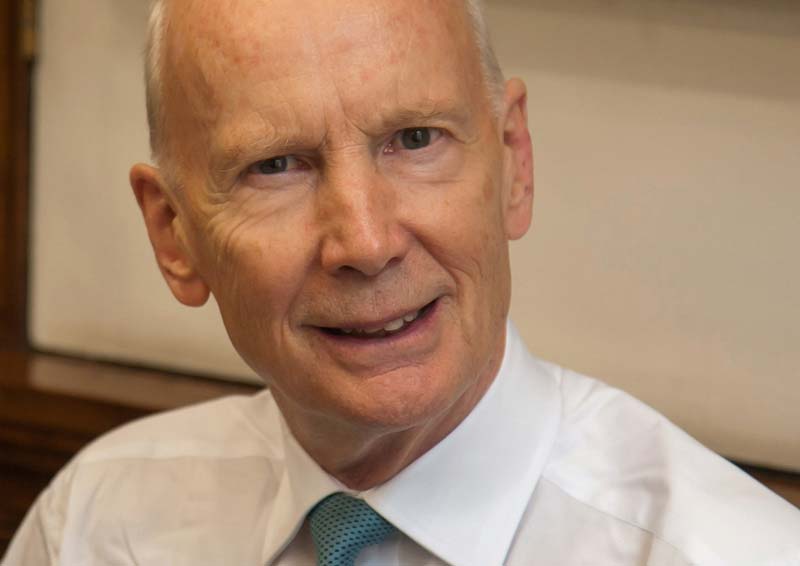 It’s time for engineers to use our skills to give everyone in the world access to clean water, power and healthcare, says the president of the Institution of Civil Engineers, Professor Lord Robert Mair
It’s time for engineers to use our skills to give everyone in the world access to clean water, power and healthcare, says the president of the Institution of Civil Engineers, Professor Lord Robert Mair
The ultimate objective of engineering is to meet people’s needs. Whether that involves building homes for families, providing road and rail links for commuting workers, or producing consumer technology, our profession provides the solutions for every aspect of modern life.
Successful engineering directly correlates with a successful society. Inadequate infrastructure provision directly stifles the achievement of social and economic goals, leading to poorer quality of life. Across the UK, we still find communities in need of critical infrastructure, blocking access to markets, jobs, and information and training.
The global picture is even bleaker. One in eight people live in extreme poverty and nearly 800 million suffer from hunger. Billions of people live in slum accommodation and cannot access clean water and sanitation. And this is all happening against a backdrop of increasing climate change and a rapidly growing population, placing unprecedented pressure on resources and the existing infrastructure.
The United Nations Sustainable Development Goals (UN SDGs) were created and adopted to address these issues, promoting prosperity for all while also preserving the planet. In 2015, the 193 UN member states agreed to adopt 17 international SDGs and achieve them by 2030.

It would be easy for many of us to overlook the relevance of the UN SDGs and assume that they are the purview of state governments or charities who work in less-developed countries. We agree that there are problems and we want to see them solved. But these problems can seem so large and formidable that they are for someone else to fix – surely someone with more power and ability than us.
But the truth is that our entire profession revolves around fixing problems and we engineers are uniquely placed to work towards meeting these goals. We are the ones who can deliver practical solutions to challenges such as resilient and clean energy, access to clean water, and sustainable urbanisation. We are the ones who can deliver real change.
Beyond the SDGs which are the most obviously relevant to our profession, engineering also lays the foundation for progress across all the goals. Better technology and infrastructure will enable and encourage better health, education and employment outcomes, and reduce inequalities.
This is why the Institution of Civil Engineers (ICE), working together with the World Federation of Engineering Organisations, is convening the Global Engineering Congress in London in October.
We will unite in an ambitious, combined and coordinated effort to tackle the five SDGs where we can make the most impact: clean water and sanitation; affordable and clean energy; industry, innovation and infrastructure; sustainable cities and communities; and climate action.
Top engineers, policymakers and experts from over 150 countries will meet to determine how to make the delivery of these SDGs a reality. Over five days, with an extensive programme of discussions and workshops, the congress will focus on how engineers can improve the lives of the billions of people around the world.
As the world’s oldest professional engineering body, ICE has a duty to lead this global debate. Over the next two years, ICE will build a practical plan that enables the global engineering profession collectively to act. We will be working with like-minded partners across the world to create an engineering sustainable development route-map. The input from congress delegates will help to set out a pathway for the whole engineering community to enable economic success while delivering benefits for society and the environment.
This is a bold undertaking but given the scale of the challenges we face today, we can no longer afford to be complacent. There is already much detailed and informed research setting out the nature of the problem, but the time has come to turn words into action.
Engineers have always used their passion, creativity and problem-solving skills to tackle the pressing issues of the day. ICE has been celebrating its bicentenary throughout 2018 and we have taken pride in the impressive achievements of our members over the past 200 years. We can highlight the example of Joseph Bazalgette’s creation of a sewer network for London – but we can also say that he effectively eradicated cholera and saved many thousands of lives. Our engineering predecessors delivered the seemingly impossible and achieved greater, far wider-reaching outcomes than could be first imagined.
There is no reason why we cannot follow in their footsteps and do exactly the same for people today. The challenges may seem greater but we have the talent, skills and technology to meet these demands head-on. We should be just as ambitious about what engineers can achieve today as we have ever been. Every engineering discipline has its part to play and every professional has a potential role. I am confident that we can and will make a difference. Billions of people around the world are depending on us.
For more information visit: www.ice.org.uk/events/global-engineering-congress




Red Bull makes hydrogen fuel cell play with AVL
Formula 1 is an anachronistic anomaly where its only cutting edge is in engine development. The rules prohibit any real innovation and there would be...